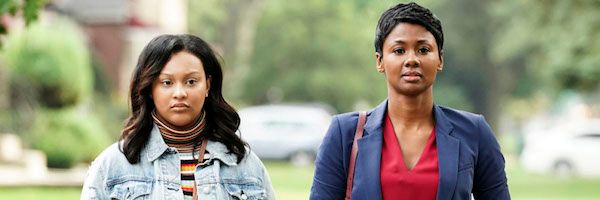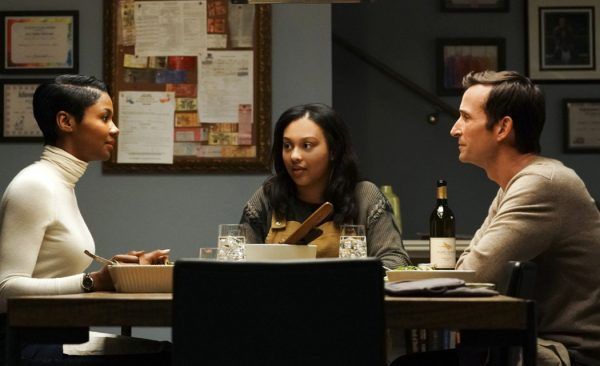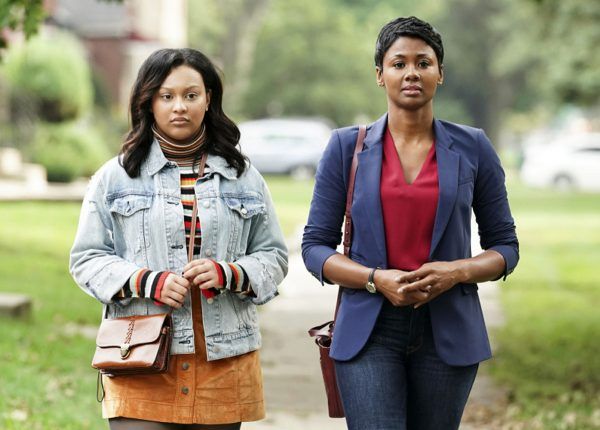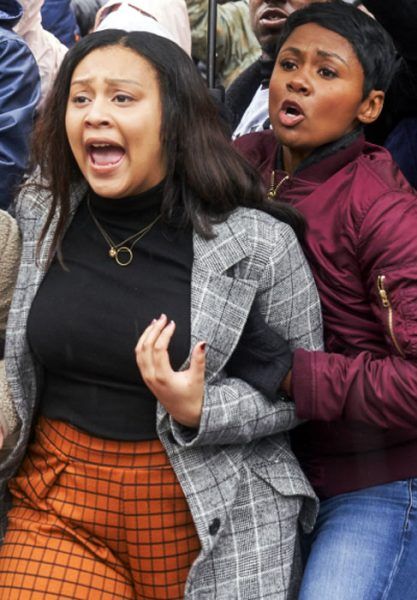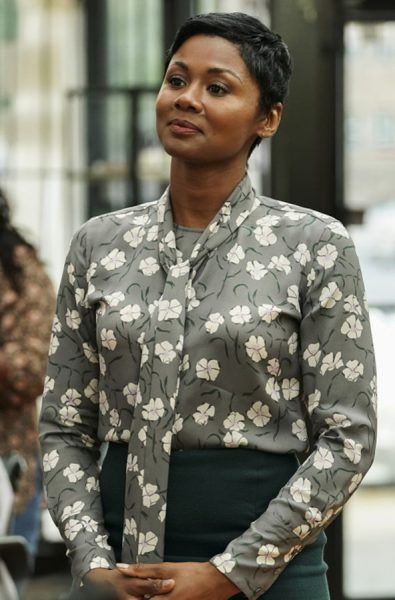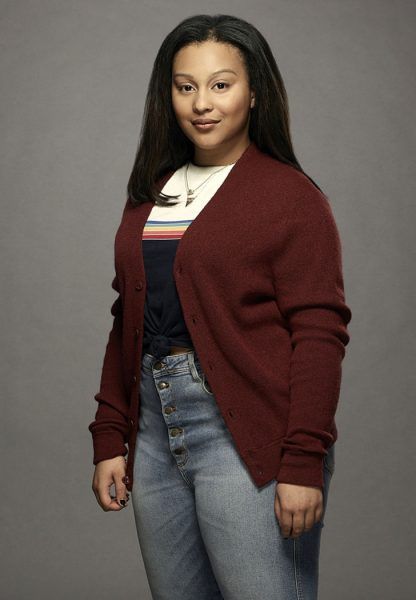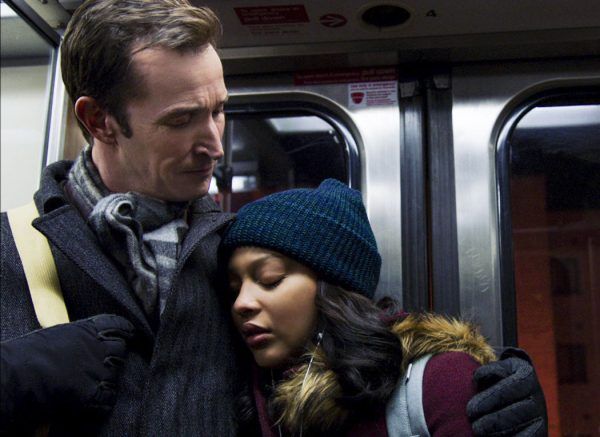From executive producers Greg Berlanti and Ava DuVernay, the eight-episode CBS limited drama series The Red Line is an emotional punch to the gut, as it follows three very different Chicago families on intersecting journeys toward healing after a tragedy. Daniel Calder (Noah Wyle) is mourning the death of his husband, an unarmed African American doctor who was shot by a white cop (Noah Fisher), and falling short on how to handle things with their grieving daughter, Jira (Aliyah Royale), while she searches for her birth mother (Emayatzy Corinealdi) to learn more about what it means to be a young black woman today.
During this 1-on-1 interview with Collider, co-stars Emayatzy Corinealdi and Aliyah Royale talked about why they were so drawn to this story, the journey they took to getting their roles, having so many female voices involved with the series, the honesty in the storytelling of Ava DuVernay, what they appreciated about their characters, showing how flawed all of these individuals are, working with Noah Wyle, and what they hope audiences will take from watching The Red Line.
Collider: When this came your way, what did they tell you about it, and what were the things that you most responded to?
EMAYATZY CORINEALDI: What I most responded to was the opportunity to discuss this kind of topic, in a way that’s through the lens of a family drama. That’s the one thing that was most intriguing for me. You’re able to dissect these three different families, all experiencing this event that has happened. It’s a tragedy that it’s happened, and it’s a chance to have more of a dialogue about it. That’s what was most intriguing for me about being a part of it.
ALIYAH ROYALE: The opportunity to spark a conversation in people about change is definitely what brought me to it. I also liked, when I read it, that Jira is resilient, and to play a teenage girl who’s definite in her choices and knows what she wants is extremely important. Especially in entertainment these days, that’s not really seen. She knows what she wants, and it’s important that we can show how it’s possible for a girl to know that she’s smart and that she deserves better, and has no problem with voicing it, even when it gets her in trouble.
Aliyah, what was the audition process like for you?
ROYALE: It was really quick. I went in and did the scene, and I felt good about it and you hope that you’ll get it. And then, I got the call for the producers session and I was like, “Oh, my goodness, this is happening.” I might have an actual shot at this. In that room, I did a scene and I felt really good about it, and the director, Victoria Mahoney, was like, “Hey, pick up the sunglasses next to you.” So, I picked them up, and sometime during that scene, the glasses broke in my hands and I ended up throwing them across the room. It was the biggest break of honest emotion that I’ve ever had in a role. When you’re doing a role that’s so relevant to the present time, more comes out of you. When it’s so real and based in something that you can physically grasp in your life today, it’s so organic, coming out of you. It’s the greatest. It was my favorite audition that I’ve ever had.
Emayatzy, what was your process like, for getting this role?
CORINEALDI: For me, it was a talking through of everything. I talked through the characters with (co-creator) Caitlin [Parrish] and (executive producer) Sarah [Schechter], just to get a feel for the world, and seeing if I meshed with it or not. So, it was a little more tame in comparison. We were just talking through it all.
There are a lot of female voices involved with this show. Did you feel that really helped you in being heard and listened to?
CORINEALDI: There were women in front of and behind the camera, and it does make you feel like there’s power in those numbers. There’s power in representation. You feel your strength, a bit more.
ROYALE: I agree. Seeing all of that strength, behind the camera and in front of the camera, it helps you find your own.
Emayatzy, Ava DuVernay is behind this show, as an executive producer, and she’s someone who you’ve worked with before. What do you like about her and her storytelling, and who she is, as an artist?
CORINEALDI: Ava is honest, in her storytelling, and she’s real. She always wants to tell her truth, of that particular experience, and in particular, the black experience. She’s adamant about that. So, working with someone who has a very clear perspective about who they are and what kind of stories they want to tell, it gives you a bit of freedom in that, as well. To be able to come alongside of her and work with her on Middle of Nowhere, it just was a treat. To work with her in a different capacity, on The Red Line, was fun, too. You get her input and you get to see her working from a different skill set than I’ve experienced, working with her working before.
ROYALE: Ava DuVernay is a fearless woman. You come to work knowing that, whatever you do, it’ll be backed by her. For all of the different emotions that we play and the places that we go, that could be really difficult to go to, you have her support.
What did you like about your character, from day one, and what have you grown to appreciate about who these women are?
ROYALE: I liked that Jira wanted more. Oftentimes, we go, “This is okay,” or “I’m fine where I am,” when we’re not, which could be the reason why we have the problems that we have now. Jira was like, “No, I want better, I deserve better, and I need better,” and it’s okay for us, as women and as people, and as young people, to say that we want more. We want to do better for ourselves and for the people that we care about, and for the people that we don’t even know.
CORINEALDI: The thing that I admired the most about Tia was her courage. She has the courage to open up her heart, in a way that she did not expect. Her life was going in this one direction, and that was it. And then, suddenly, she’s turned another direction. That takes a level of courage. It took courage for her to step into a role that she’s completely unfamiliar with. When she decides, “I’m gonna try to make a change, by running for office,” you don’t know the answers. She’s a woman who lives her life in a very methodical way, which is why, when it’s disrupted, she has to figure that out. But that method helps her in her professional life because she’s able to go forward and say, “I’m gonna do this and figure it out, as I go.” There’s something that I admire about the fearlessness in that. I may not know the answer, but I’ll find it.
Do you think she ever regrets making the leap that she made, or do you think it just makes her stronger, the more obstacles she hits along the way?
CORINEALDI: No, I don’t think she regrets it. If anything, she would ultimately be trying to figure out what more she could do. She might even feel guilt that she hasn’t done it before now. That’s the kind of person she is. I don’t think she would have any regrets about it.
Was it also really important to you to show how flawed these characters are and that they make mistakes?
CORINEALDI: We had a scene, where we’re walking down the street and Tia is trying to say something, and it comes out the wrong way because she doesn’t quite know how to say it. You’re trying to navigate a new relationship and new territory, and figure out where you land in that.
ROYALE: And Jira has a systematic thinking process. She’s very much, A + B = C.
CORINEALDI: They’re similar, in that way.
ROYALE: Exactly! Once you have a cause that has multiple effects and there are so many different options and choices, she’s stuck. Jira thinks that there should only be one answer, and the truth is that there isn’t, in the real world. It’s not just Jira wants to meet her birth mom. Her birth mom has an entire family. She became someone, after the moment that she gave her up, and it’s really hard to see that and recognize that. Jira is just like, “I need my family, so I’ll just meet my birth mom.” Jira looks in the mirror and, suddenly, she doesn’t understand what she’s supposed to see, and she needs help. She just thinks that the only person who looks like her is her birth mom, which is why she sets out to find her.
What was it like to go on that family journey with her, while she’s seeking that relationship with her birth mother, even though the father who adopted her is still right there?
ROYALE: It was about realizing that there is room for both of them. More family does not mean you take away the old family. It just means that you come together and create something new, and you create something more community. Jira is learning that there’s room for both parents. That was crucial to the story.
That scene when they’re all at the dinner table was just so emotionally moving to watch.
CORINEALDI: Yeah, that’s one of my favorite moments. That’s real life. It’s always a little tricky.
What did you enjoy about working with Noah Wyle?
CORINEALDI: I was really excited to work with Noah. He has such a long pedigree, in this business. He’s been around for so long, and it was exactly what I hoped it would be, in that he’s so free. You get into a scene with him, and he plays and tries different things, so you don’t know what you’re gonna get. That’s my favorite way of working, and that’s what I really loved about working with him. And then, his experience and his knowledge, from being on set, was a full experience for me.
ROYALE: I like to think of myself as a heavy-hitter when it comes to scenes. It’s why I love drama. I really get down and dirty with it, and to get in the ring with someone who can hit just as hard was pretty awesome. Noah challenged me, every step of the way, to find new emotions and discover something spontaneous that I could never plan, as the actor playing the character.
By the end of the season, how do you think the audience is going to feel with where things are left?
CORINEALDI: My hope is that people will come out of this show, after seeing all eight episodes, and feel like they had this experience. It’s my hope that this show will bring this story right into your living room, and then make you face your feelings about it. It will make you face your own prejudices and fears about it, and then really be able to do something about those feelings, or at least talk about them with other people, whether that’s your family or your co-workers. What’s missing from our national dialogue right now is talking about it. We’re tip-toeing around certain things, and we need to have real discussions. We’ve made leaps and bounds, but there is still a lot further that we can go. So, that would be my hope, as far as what people would get from the show.
ROYALE: I hope that the people who need it, get a little peace. There are resolutions on the show, but there are also definitely twists and turns that are unexpected, and everyone is gonna have a multitude of emotions. Hopefully, it will make people talk to each other and try to listen and really connect in ways that people haven’t tried to connect with each other before.
CORINEALDI: One of the things that people are sometimes not able to connect with is grief, especially if it hasn’t happened to you and you haven’t had that experience of losing someone. This show puts that right into your lap. You get to experience the grief of the families who have to deal with this, and you get to see Noah’s character dissect this whole thing and see where he lands. I think it’s a really great opportunity for America to be able to stop and think about this.
The Red Line airs on Sunday nights on CBS.

